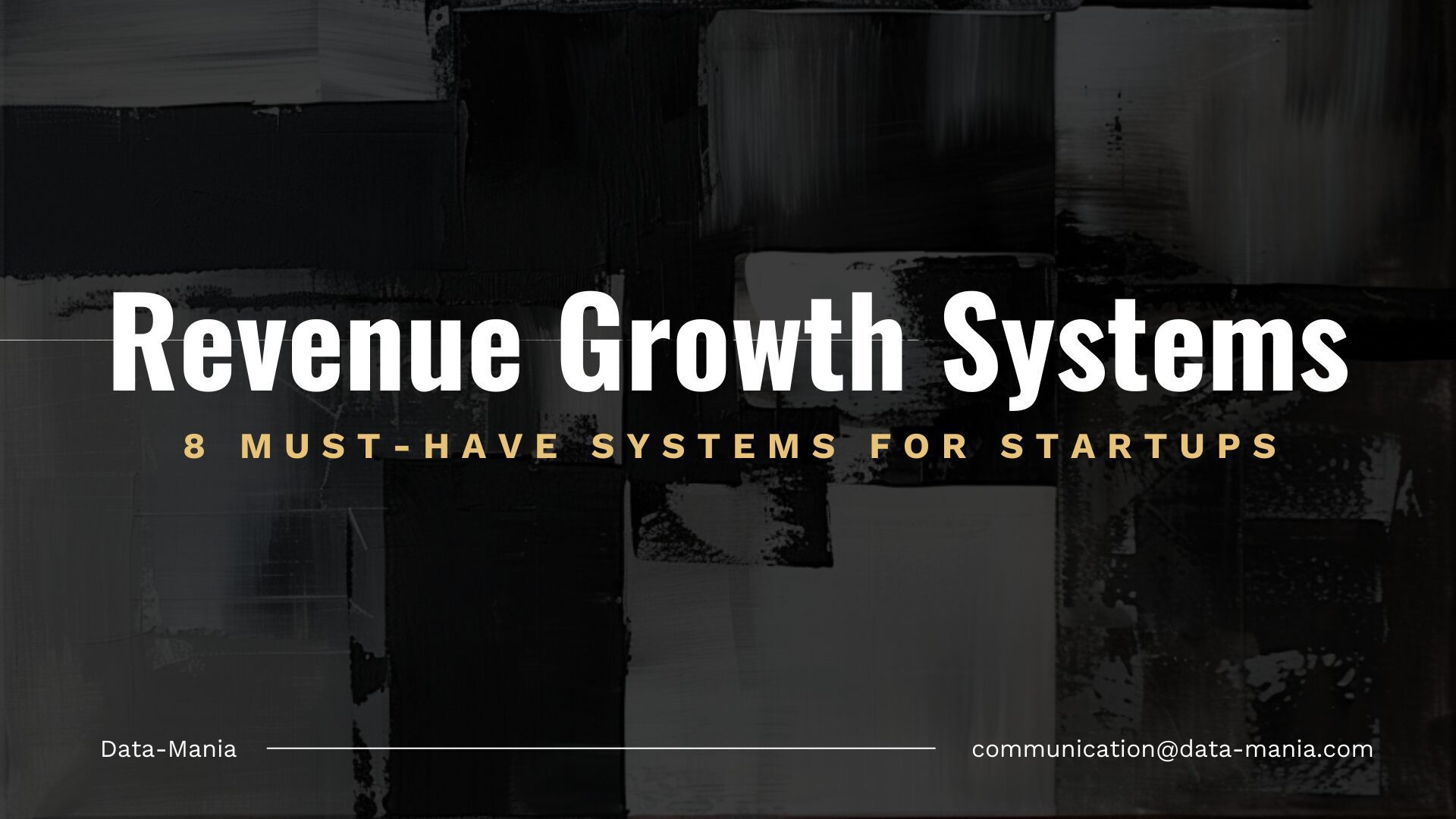Startups exist in a fiercely competitive ecosystem. Without adapting and growing – death is certain. That’s why you need to future proof your startup revenue growth by making sure you’re covered on the 8 essential business system types that we’re sharing in this blog post.
The facts are scary – in the global startup industry, that’s predicted to be worth over $3.6 trillion by 2025, an overwhelming 90% of startups will fail in the first 3 years of operations.
In 2024, the startup ecosystem is filled with fiercely competitive and adaptive entrepreneurs who are extremely agile, globally-connected, and highly reliant on truly innovative systems for their company’s survival and startup revenue growth.
Emerging systems and technologies such as artificial intelligence, blockchain, and advanced data analytics are now serving as lifelines for startup entrepreneurs, offering unprecedented opportunities to scale, connect with target audiences, streamline operations, and increase revenue.
In this article, we compiled a list of 8 essential system types for both seasoned startup entrepreneurs and first-time founders starting their journey that cater to various aspects of startup operations and help boost startup revenue growth in 2024.
Why founders need to embrace new and innovative systems to accelerate startup revenue growth
Startups seeking to stay ahead require innovation and the adoption of innovative systems.
As startup founders and entrepreneurs, you need powerful and innovative systems in place in order to:
- Accelerate overall startup revenue growth,
- Optimize startup operations,
- Connect with new and existing customers,
- Protect your assets and infrastructure, and
- Navigate the complexities of the business landscape.
These functions are critical to accelerating your startup revenue growth in an efficient manner.
Startups must therefore strategically integrate digital resources like digital marketing tools, financial management platforms, e-commerce platforms, cybersecurity resources, remote work solutions, and others to drive revenue growth and build a foundation for long-term success in the ever-changing world of entrepreneurship.
8 essential system types of startup revenue growth
We’ve broken down these system types into 8 logical categories as follows…
1. Startup marketing tools
The crazy world of startups requires a strategic approach to marketing.
In 2024, the business landscape is very dynamic and as such, leveraging the right marketing systems and B2B e-commerce solutions is a startup game-changer.
To boost revenue growth, startups need tools with features that provide solutions to their specific marketing needs These tools include:
- Social media marketing tools: Leading social media platforms such as Instagram, Facebook, Twitter, and LinkedIn provide startups with a direct avenue to connect with their target audience. Tools like Hootsuite, Buffer, and Sprout Social help startups build a strong online presence and engage their audience effectively by streamlining social media management, scheduling, and analytics.
- Email marketing automation tools: From automated drip campaigns to personalized content to customers, platforms like MailChimp, HubSpot, and Klaviyo help streamline workflows, boost conversion rates, and nurture leads throughout the customer journey.
- SEO and content marketing resources: Platforms like SEMrush, Ahrefs, and Google Analytics boost online visibility by offering clear insights into keyword performance, competitor analysis, and overall website health. Also, you can use tools like Grammarly to create compelling content that captivates your audience and drives organic traffic.
2. Financial management platforms
To maximize startup revenue growth, effective financial management is critical.
Financial planning and management tools are important for startups looking to optimize revenue growth. From forecasting, budgeting, and creating an investor agreement template, to real-time analytics, these platforms offer a comprehensive suite of features designed to enhance financial decision-making. These tools include:
- Accounting software for startups: Platforms like QuickBooks, Xero, and FreshBooks offer easy-to-understand interfaces, automated bookkeeping, and real-time financial reporting for accurate and efficient accounting to streamline financial operations and ensure compliance with accounting standards.
- Expense tracking apps: Apps like Expensify, Zoho Expense, and Receipts by Wave offer receipt scanning, automated categorization, and real-time expense reporting for startups to maintain financial health, make informed decisions, gain control over expenditures, optimize budgets, and improve their overall financial efficiency.
- Payment and invoicing platforms: For startups, timely and accurate invoicing and efficient payment processing are critical for maintaining healthy cash flow. Payment and invoicing platforms like Stripe, Square, and FreshBooks Payments drive seamless online transactions, automate invoicing processes, and improve the overall payment experience for startups and their clients.
3. Project management solutions
For startups juggling multiple projects and deadlines, project management solutions are critical.
Efficient project management tools drive innovation, productivity, and revenue growth for startups seeking to execute projects and boost revenue growth. These tools include:
- Task management apps: Platforms like Todoist, Wunderlist, and Microsoft To-Do provide task categorization, due date tracking, and collaboration functionalities to help startups organize, prioritize, track tasks, and enhance team productivity.
- Collaboration platforms: In this era of remote work and global collaboration, startups need collaboration platforms like Slack, Microsoft Teams, and G-Suite to enable real-time communication but also offer file sharing, project-specific channels, and integration capabilities.
- Workflow automation tools: Tools like Zapier, Automate.io, and Integromat optimize startup processes, reduce manual efforts, and focus on high-impact activities that boost revenue growth and successful project execution.
4. Customer relationship management (CRM) systems
Customer relationships lie at the heart of startup success.
Centralizing customer data, tracking interactions, and personalizing communication help startups maintain a loyal customer base and grow revenue. These tools include:
- Customer data management tools: Platforms like Airtable, Insightly, and Pipedrive offer features such as contact segmentation, data analytics, and integration capabilities, providing startups with a comprehensive view of their customers and enabling personalized and targeted engagement.
- Sales automation platforms: To optimize sales funnels, reduce manual tasks, and focus on building meaningful relationships with prospects, startups can use tools like Salesflare, Close.io, and Freshsales to automate lead management, sales outreach, and pipeline tracking.
- Customer support software: Offering features such as ticketing systems, live chat, and knowledge bases, customer support software like Zendesk, Intercom, and Freshdesk helps startups provide timely and personalized support, address customer queries, and improve overall customer experience.
5. E-commerce platforms
Having a strong online presence on e-commerce platforms is a necessity for startups.
The global shift towards e-commerce has reshaped the business landscape, and startups now have to establish a strong online presence with platforms such as Shopify, WooCommerce, and BigCommerce. To continually retain their online presence, startups have to use tools such as:
- Online store builders: For startups, online store builders like Wix, Squarespace, and Weebly offer intuitive drag-and-drop interfaces, responsive design templates, and integrated e-commerce functionalities to help startups design and manage their e-commerce websites with ease.
- Payment gateways and checkout solutions: Seamless and secure payment gateways and checkout solutions like Stripe, PayPal, and Square support multiple currencies, and improve the overall checkout experience for customers shopping on startups’s online stores.
- Inventory management tools: Inventory management tools such as TradeGecko, Zoho Inventory, and Orderhive enable startups to track stock levels, manage product variants, synchronize inventory across multiple sales channels, streamline order fulfillment, and enhance overall customer satisfaction.
6. Cybersecurity resources
Startups can’t afford to joke about the threat of cyber-attacks
The surge in digitalization has opened new opportunities for startups, but it has also given rise to cyber threats. There’s a critical need for startups to prioritize cybersecurity to protect sensitive data, safeguard customer trust, and secure the digital infrastructure of startups. These tools include:
- Antivirus software: Leading antivirus programs such as Bitdefender, Norton, and McAfee offer real-time scanning, threat detection, and system optimization features as first-line defense programs against viruses, malware, and other cybersecurity threats.
- Secure communication tools: Effective and secure communication tools like Signal, Wickr, and Telegram provide end-to-end encryption, secure file sharing, and self-destructing messages, ensuring that confidential communications remain protected and a secure business environment is created.
- Data encryption solutions: As startups handle an increasing amount of sensitive data, data encryption solutions such as VeraCrypt, Symantec Endpoint Encryption, and BitLocker enable the encryption of files, folders, and entire disk drives.
7. Analytics and data insights solutions
Startups require analytics and data insights to make smart decisions and boost revenue.
To understand their customers, optimize operations, and drive revenue growth, startups must embrace the power of data-driven decision-making. Tools that can help with these include:
- Web analytics platforms: Understanding user behavior across web-based platforms is crucial for startups looking to optimize their online presence. Platforms such as Google Analytics, Mixpanel, and Hotjar offer insights into website traffic, user engagement, and conversion rates.
- Data visualization tools: Data, when presented visually, becomes a powerful tool for understanding complex trends and patterns. Tools like Tableau, Power BI, and Infogram help startups to transform raw data into interactive and easy-to-understand visual information to communicate insights effectively, make informed decisions, and foster a data-driven culture within their organizations.
- Business intelligence solutions: Tools such as Looker, Domo, and Sisense, go beyond basic analytics to provide holistic insights into various aspects of business operations. These solutions integrate data from multiple sources and offer a unified view that facilitates strategic decision-making to analyze trends, forecast future performance, and optimize business processes for sustained revenue growth.
8. Remote work solutions
In today’s world of startups, remote work is a pivotal strategy for success.
The modern startup environment demands flexibility, efficiency, and seamless collaboration – qualities that remote work solutions provide. By embracing remote work solutions, startups will not only attract top talent but also optimize operations for sustained revenue growth. These tools include:
- Video conferencing platforms: In the startup world where face-to-face interactions are not always possible, video conferencing platforms have become essential for effective communication. Platforms such as Zoom, Microsoft Teams, and Google Meet provide startups with the capability to host virtual meetings, conduct presentations, foster team collaboration in real-time across geographical gaps, improve team connectivity, and contribute to the overall success of remote work initiatives.
- Project management tools with remote capabilities: The coordination of tasks and projects is vital for remote teams. Project management tools such as Asana, Trello, and Notion help with task assignment, progress tracking, and team collaboration, ensuring that startups can maintain operational efficiency regardless of their team members’ physical locations and drive revenue growth in the remote work landscape.
- Communication and chat apps: Effective communication is the backbone of remote work success. Communication and chat apps like Slack, Microsoft Teams, and Telegram go beyond traditional email communication, offering real-time chat, file sharing, and collaboration features to create a virtual workspace where remote teams can stay connected, fostering a culture of collaboration essential for boosting startup revenue growth.





